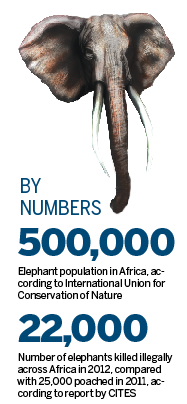Illegal ivory stash destroyed
By YANG YAO in Dongguan, Guangdong province (China Daily) Updated: 2014-01-07 00:39Move reflects China's resolve to combat poaching in Africa
|
 |
|
More than 6 metric tons of elephant tusks and products carved from ivory are destroyed in Dongguan, Guangdong province, on Monday. Wang Zhen / For China Daily |
China has destroyed 6.1 metric tons of elephant ivory seized over the years, hoping to send a zero-tolerance message to poachers.
The haul was crushed on Monday in Dongguan, Guangdong province — the first time the nation has destroyed confiscated elephant tusks.

"We want to send a clear message that China will not tolerate ivory trafficking," said Zhang Jianlong, deputy head of the State Forestry Administration, China's wildlife watchdog.
The forestry administration and the General Administration of Customs pulverized the illegal ivory items, worth about 200 million yuan ($33.04 million), at 3:30 pm. They ranged from elephant tusks to small products carved from ivory.
The tusks were cut into pieces before being placed in two pulverizers to be crushed into powder.
Wang Weisheng, an official at the forestry administration, said the remains will not be used for commercial purposes. Some will be sent to museums for exhibition and educational purposes, while the rest will be preserved by customs authorities.
Chunquan Zhu, country representative of the International Union for Conservation of Nature, said confiscated elephant tusks are usually preserved after cases are concluded.
"These tusks, if sold, would be worth a huge amount of money," Zhu said. "The government's decision to destroy them shows its determination to combat ivory smuggling and wildlife crime."
In December, an African Elephant Summit was held in Botswana, where African states with elephant populations, countries where ivory transits, and major ivory-consumer states agreed on a set of measures to protect elephants, strengthen enforcement measures and to raise public awareness.
"The destruction of this confiscated ivory so soon after the African Elephant Summit is a very positive step by the Chinese government," Zhu said.
The international community, governments and international organizations also applauded the move.
Jane Goodall, UN Messenger of Peace, said the move is a landmark decision to end the illegal ivory trade.
Tom Milliken of TRAFFIC, the only global organization that focuses on monitoring wildlife trade, said the public destruction of seized ivory, along with other efforts by the Chinese government, will have a significant impact on the market for illicit ivory in China.
He hopes the government promotes the fact that the destroyed ivory came from elephants that were killed illegally, because many Chinese still do not realize the connection between buying ivory products and elephant-killing in Africa.
The Convention on International Trade in Endangered Species of Wild Fauna and Flora (CITES) banned international ivory trade in 1989. But a report it published last year found elephant poaching was at its highest level for a decade and rising.
The Wildlife Conservation Society, an international environmental NGO, estimates that an average of 96 elephants a day are killed for the ivory trade, putting elephant populations in some countries at risk of extinction.
The African elephant population has fallen by 60 percent in the past 30 years, said Zhang Li, a member of the international technical advisory group of the CITES program monitoring the illegal killing of elephants.
Statistics from the monitoring program show that 22,000 African elephants were killed illegally last year.
Figures from the Elephant Trade Information System, a comprehensive system to track illegal trading in ivory and other elephant products, show that more than 34 tons of tusks were seized in 2012, while in 2013 a record 41.6 tons of tusks were seized.
Lyu Bin, deputy administrator of the General Administration of Customs, said the large seizures of illegal ivory reflect strict law enforcement.
China has seized more than 50 metric tons of illegal ivory in past years, according to Yang Liuying, an official at the General Administration of Customs.
Officials did not give a clear answer on how to deal with the rest of the ivory seizure and future confiscations, but they said they will work on plans that suit the best interests of elephant conservation.
Zhang, at the State Forestry Administration, said the agency will continue to work with different departments and countries to curb poaching and smuggling.
Chinese legislation on combating wildlife crime is among the strictest in the world, Zhang said.
He said international cooperation is needed to crack down on an illegal chain, which includes poaching, transportation, smuggling and illegal manufacturing.
Gabon, Kenya, the Philippines and the United States have previously destroyed ivory seizures, and France is considering doing so, Zhang said.
- More female officials caught in corruption
- Whampoa veterans recorded with glory
- Police bust 9 terrorist groups in Xinjiang
- Knife-wielding attackers seized in Xinjiang
- New regulation leads to drop in petitioned cases
- Hunan plant shut as probe into lead poisoning begins
- Police boost efforts to combat gambling
- Project offers jobs openings to legal experts
- Experts: Dog meat festival 'illegal'
- Nation looks to upgrade
pipeline networks






